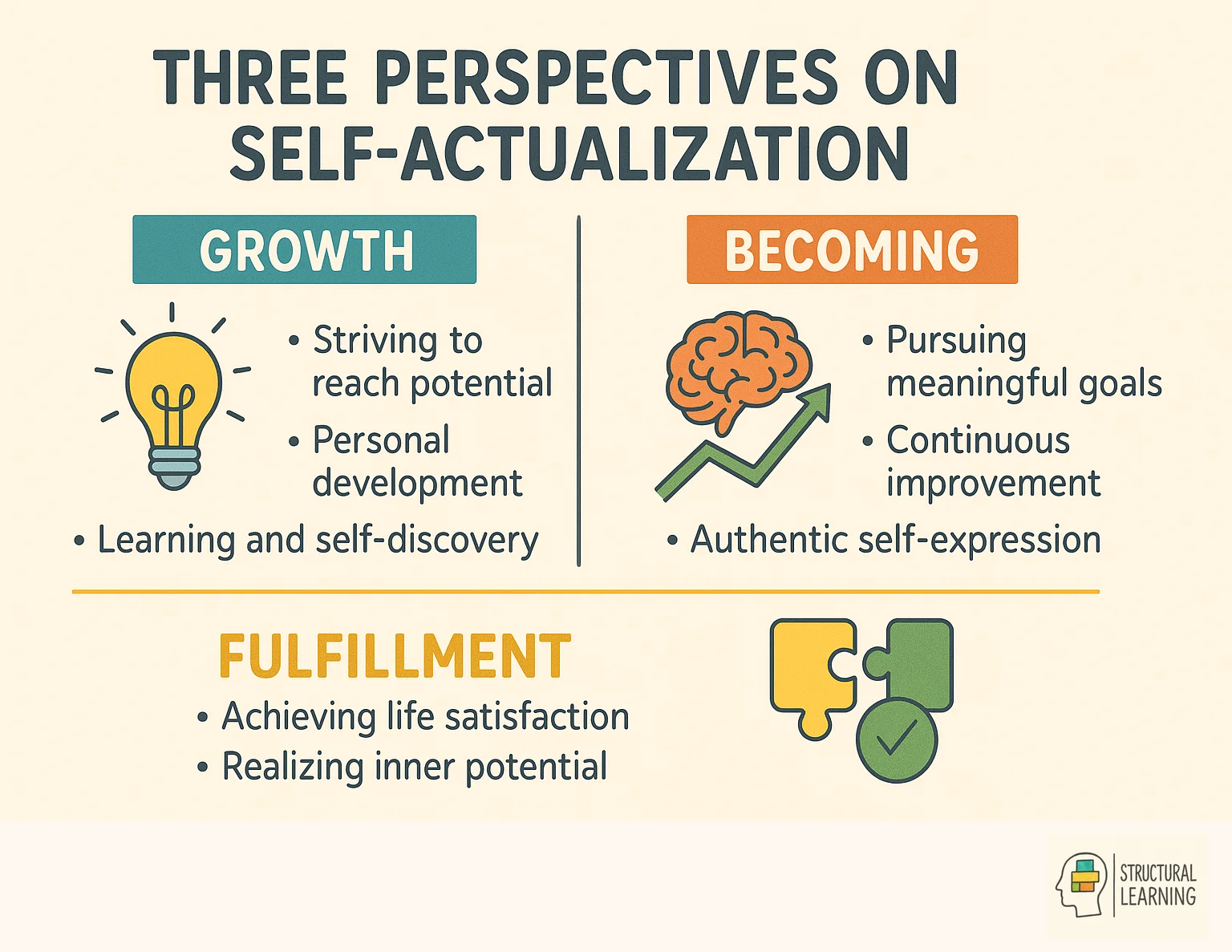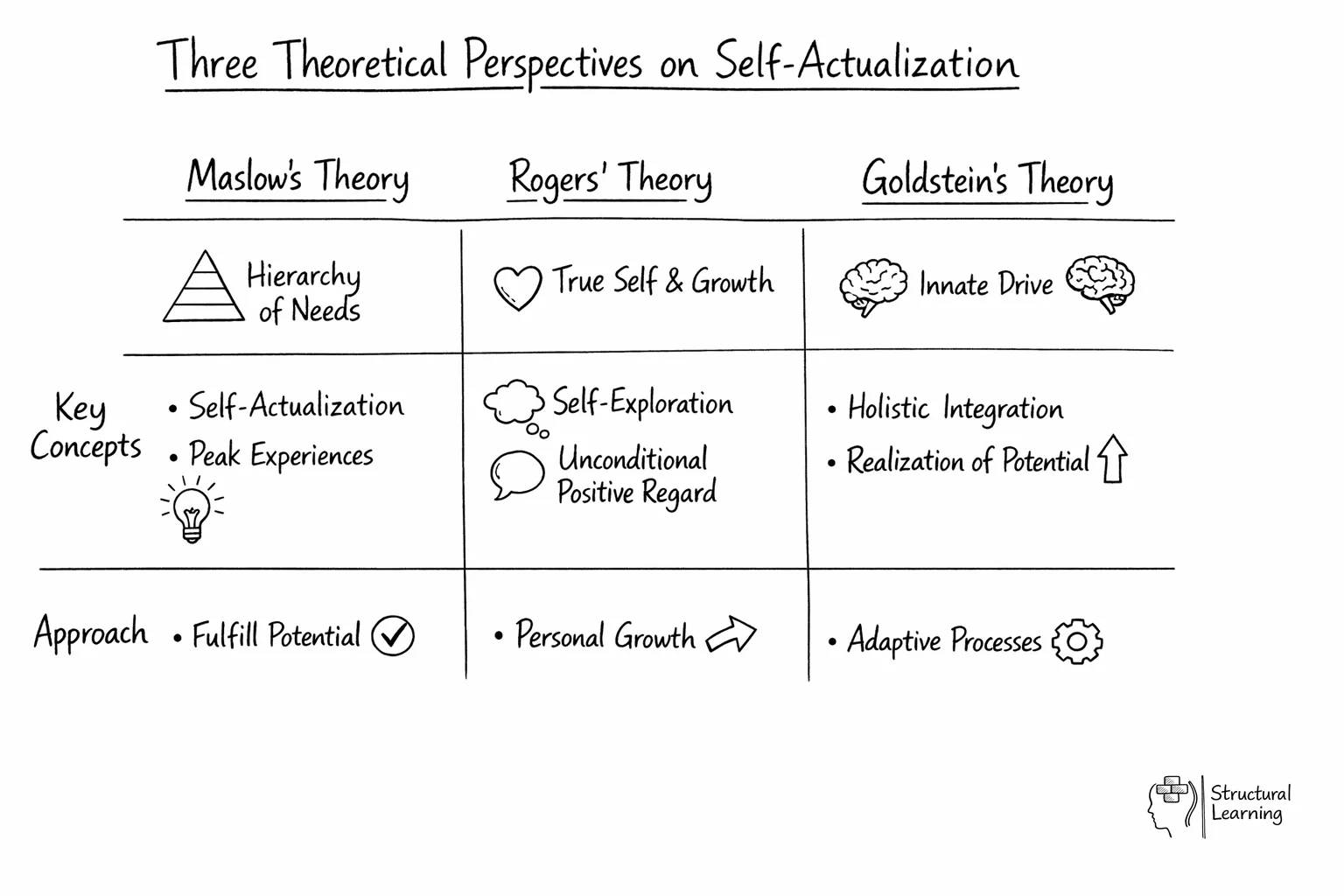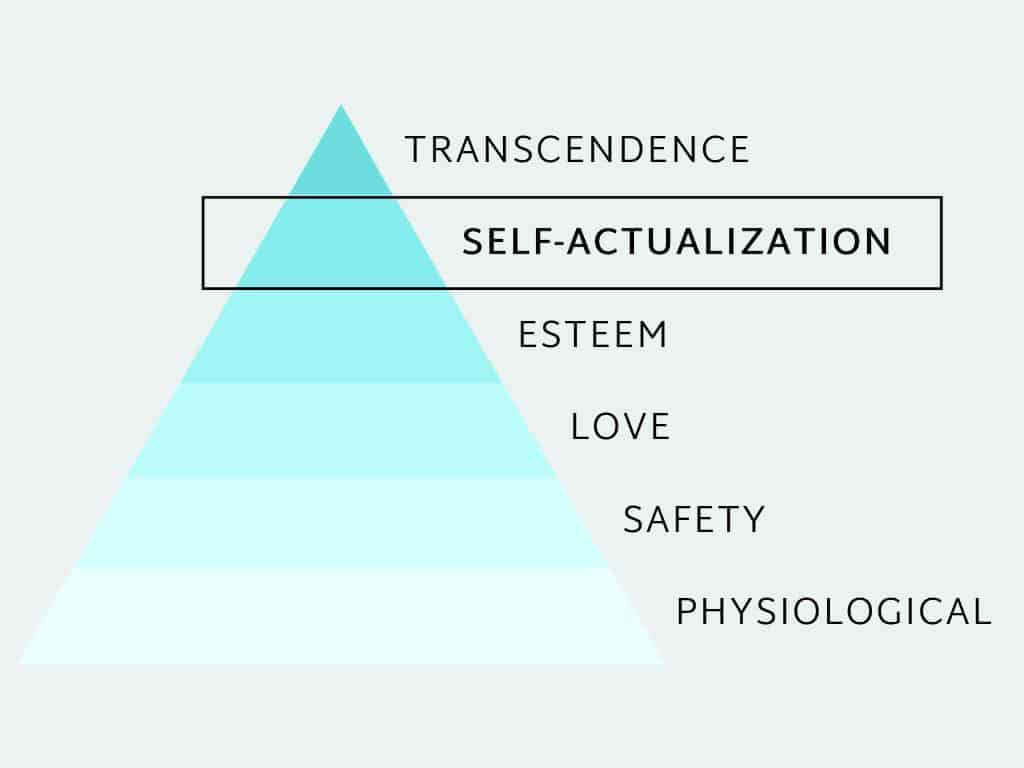Self-Actualization
Self-actualization involves individuals pursuing their full potential and unique purpose, motivated by a deep desire for personal growth and development.


Self-actualization is the highest level of personal growth in . It means reaching your fullest potential. Abraham Maslow described it as the top level of his pyramid of needs.
The journey to self-actualization is deeply personal and, according to systems theory, influenced by multiple interconnected factors. It varies from person to person based on experiences, cultural capital, and goals. It involves growing and learning throughout life, much like the spiral curriculum approach to education. Self-actualized people often have peak experiences of joy, understanding, and happiness.

Three key points capture what self-actualization means:

Abraham Maslow was an American psychologist who gave us the most well-known definition of self-actualization. He said it is the process of becoming everything you are capable of becoming.
True self-actualization is not just about reaching goals. It involves a deeper understanding of yourself, including both strengths and weaknesses. This requires social-emotional learning and a willingness to face personal challenges.
According to motivation theory, we must meet our basic needs before we can self-actualize. Maslow arranged needs into a pyramid:
Mental health is also key. Maslow believed people need emotional wellbeing to reach self-actualization. Without addressing mental health, it is hard to move up the pyramid.

Maslow's hierarchy of needs is a five-level pyramid showing human needs from basic to complex, with self-actualization at the top. The levels progress from physiological needs, safety, love and belonging, esteem, to self-actualization. People must satisfy lower-level needs before pursuing higher ones, though this progression isn't always linear.
A San Diego therapist, Kim Egel, defined self-actualization as the ability to become the best version of yourself. Both Maslow and Egel agree it is about reaching your full potential.
But what does this mean in practice? And how do you know if you have achieved it?
Self-actualization does not mean things will always go smoothly. You may still face difficulties. A key part is knowing your limits as well as your strengths, which helps build resilience in students.
Like Kurt Goldstein before him, Maslow saw self-actualization as reaching your fullest potential. But Maslow focused only on humans, not all living things. His theory says the drive to self-actualize only appears after basic needs are met.

Carl Rogers viewed self-actualization as the ongoing process of becoming your authentic self through personal growth and self-acceptance. He emphasised that people naturally move toward growth when provided with unconditional positive regard, empathy, and genuine relationships. Rogers believed the right environment was crucial for allowing individuals to reach their full potential.
Rogers believed you can only self-actualize if you have a positive view of yourself. This happens when people around you, especially parents, show you respect without conditions.
Rogers said self-actualization is possible when how you see yourself matches your ideal self. A big gap between these two leads to negative feelings that block growth, which is why constructive feedback is so important.
Your environment matters too. A positive environment helps your growth. An oppressive one holds you back. This is why educational scaffolding and student engagement strategies are crucial in creating supportive learning environments. Teachers must also understand individual learning needs and adapt their curriculum approaches accordingly. When classroom environments become challenging, effective behavio r management strategies help maintain the positive atmosphere needed for growth.
d-sizes='(max-width: 479px) 92vw, (max-width: 767px) 95vw, (max-width: 991px) 46vw, 47vw' data-rt-type="html">
Kurt Goldstein was a neurologist and psychiatrist who first used the term self-actualization. He saw it as the driving force behind all living things, not just humans. Goldstein believed every organism tries to reach its full potential within its environment.
Unlike Maslow, Goldstein did not create a hierarchy. He thought self-actualization was a continuous process present from birth. He saw it as vital to health and well-being.
Goldstein's work influenced Maslow and Rogers. They both expanded on his ideas, applying them to human psychology. His complete approach highlighted the importance of seeing individuals as whole beings striving for growth.
Understanding self-actualization helps teachers create environments where pupils can thrive. Here are some ways to apply these theories in the classroom:
By creating a supportive and stimulating learning environment, teachers can help pupils on their journey towards self-actualization. This involves understanding their individual needs, developing their strengths, and encouraging them to reach their full potential.
Self-actualization, as defined by Maslow, Rogers, and Goldstein, is a journey towards personal growth, authenticity, and reaching one's full potential. For educators, understanding these theories offers invaluable insights into how to cultivate environments where pupils can thrive, developing not only academic achievement but also emotional well-being and a sense of purpose. By addressing basic needs, encouraging self-expression, and promoting positive relationships, teachers can helps pupils to embark on their own unique paths towards self-discovery and fulfilment.
Ultimately, the role of education extends beyond imparting knowledge; it is about nurturing the complete development of each individual, enabling them to become self-aware, resilient, and capable of contributing meaningfully to the world. By embracing the principles of self-actualization, educators can play a pivotal role in shaping a future generation that is not only academically proficient but also deeply connected to their own potential and driven to make a positive impact.
Teachers can identify self-actualizing pupils by observing specific behaviours and characteristics that indicate personal growth and authentic self-expression. These students typically demonstrate intrinsic motivation, creative problem-solving approaches, and a willingness to take intellectual risks. They often show resilience when facing challenges and maintain curiosity beyond curriculum requirements.
Look for pupils who ask thought-provoking questions that extend beyond lesson objectives. These learners often make unexpected connections between subjects and apply knowledge in novel ways. They might challenge conventional thinking respectfully or propose alternative solutions to problems. Self-actualizing pupils frequently engage in self-directed learning, pursuing topics that genuinely interest them during free time or choosing challenging extension activities voluntarily.
Social indicators include pupils who maintain authentic friendships whilst resisting negative peer pressure. They demonstrate empathy and support classmates without seeking recognition. These students often take leadership roles naturally, not through dominance but through genuine collaboration and respect for others' contributions. Teachers might notice these pupils expressing unpopular but well-reasoned opinions or standing up for values they believe in, even when it's difficult.
Practical strategies for supporting self-actualization include creating opportunities for authentic choice, implementing reflective practices, and designing learning experiences that connect to pupils' personal interests and goals. Teachers can creates growth by providing differentiated challenges that stretch pupils appropriately whilst maintaining psychological safety. Regular one-to-one conversations about personal progress and aspirations help pupils develop self-awareness.
Implement 'passion projects' where pupils explore topics of genuine interest with teacher guidance. Allow flexible groupings so pupils can work with different peers based on shared interests rather than ability alone. Create classroom rituals that celebrate diverse forms of achievement, not just academic success. For instance, weekly 'growth moments' where pupils share personal breakthroughs or challenges overcome. Use learning journals where pupils reflect on their progress, setbacks, and evolving understanding of themselves as learners.
Design assessment practices that emphasise personal growth over comparison with others. Portfolio assessments work particularly well, allowing pupils to curate evidence of their development across multiple dimensions. Teach metacognitive strategies explicitly, helping pupils understand their own learning processes. Encourage pupils to set personal goals that align with their values and interests, then support them in creating action plans. Regular check-ins help maintain momentum whilst allowing adjustments based on evolving self-understanding.
Maslow's hierarchy in education
Self-actualization is the highest level of personal growth in . It means reaching your fullest potential. Abraham Maslow described it as the top level of his pyramid of needs.
The journey to self-actualization is deeply personal and, according to systems theory, influenced by multiple interconnected factors. It varies from person to person based on experiences, cultural capital, and goals. It involves growing and learning throughout life, much like the spiral curriculum approach to education. Self-actualized people often have peak experiences of joy, understanding, and happiness.

Three key points capture what self-actualization means:

Abraham Maslow was an American psychologist who gave us the most well-known definition of self-actualization. He said it is the process of becoming everything you are capable of becoming.
True self-actualization is not just about reaching goals. It involves a deeper understanding of yourself, including both strengths and weaknesses. This requires social-emotional learning and a willingness to face personal challenges.
According to motivation theory, we must meet our basic needs before we can self-actualize. Maslow arranged needs into a pyramid:
Mental health is also key. Maslow believed people need emotional wellbeing to reach self-actualization. Without addressing mental health, it is hard to move up the pyramid.

Maslow's hierarchy of needs is a five-level pyramid showing human needs from basic to complex, with self-actualization at the top. The levels progress from physiological needs, safety, love and belonging, esteem, to self-actualization. People must satisfy lower-level needs before pursuing higher ones, though this progression isn't always linear.
A San Diego therapist, Kim Egel, defined self-actualization as the ability to become the best version of yourself. Both Maslow and Egel agree it is about reaching your full potential.
But what does this mean in practice? And how do you know if you have achieved it?
Self-actualization does not mean things will always go smoothly. You may still face difficulties. A key part is knowing your limits as well as your strengths, which helps build resilience in students.
Like Kurt Goldstein before him, Maslow saw self-actualization as reaching your fullest potential. But Maslow focused only on humans, not all living things. His theory says the drive to self-actualize only appears after basic needs are met.

Carl Rogers viewed self-actualization as the ongoing process of becoming your authentic self through personal growth and self-acceptance. He emphasised that people naturally move toward growth when provided with unconditional positive regard, empathy, and genuine relationships. Rogers believed the right environment was crucial for allowing individuals to reach their full potential.
Rogers believed you can only self-actualize if you have a positive view of yourself. This happens when people around you, especially parents, show you respect without conditions.
Rogers said self-actualization is possible when how you see yourself matches your ideal self. A big gap between these two leads to negative feelings that block growth, which is why constructive feedback is so important.
Your environment matters too. A positive environment helps your growth. An oppressive one holds you back. This is why educational scaffolding and student engagement strategies are crucial in creating supportive learning environments. Teachers must also understand individual learning needs and adapt their curriculum approaches accordingly. When classroom environments become challenging, effective behavio r management strategies help maintain the positive atmosphere needed for growth.
d-sizes='(max-width: 479px) 92vw, (max-width: 767px) 95vw, (max-width: 991px) 46vw, 47vw' data-rt-type="html">
Kurt Goldstein was a neurologist and psychiatrist who first used the term self-actualization. He saw it as the driving force behind all living things, not just humans. Goldstein believed every organism tries to reach its full potential within its environment.
Unlike Maslow, Goldstein did not create a hierarchy. He thought self-actualization was a continuous process present from birth. He saw it as vital to health and well-being.
Goldstein's work influenced Maslow and Rogers. They both expanded on his ideas, applying them to human psychology. His complete approach highlighted the importance of seeing individuals as whole beings striving for growth.
Understanding self-actualization helps teachers create environments where pupils can thrive. Here are some ways to apply these theories in the classroom:
By creating a supportive and stimulating learning environment, teachers can help pupils on their journey towards self-actualization. This involves understanding their individual needs, developing their strengths, and encouraging them to reach their full potential.
Self-actualization, as defined by Maslow, Rogers, and Goldstein, is a journey towards personal growth, authenticity, and reaching one's full potential. For educators, understanding these theories offers invaluable insights into how to cultivate environments where pupils can thrive, developing not only academic achievement but also emotional well-being and a sense of purpose. By addressing basic needs, encouraging self-expression, and promoting positive relationships, teachers can helps pupils to embark on their own unique paths towards self-discovery and fulfilment.
Ultimately, the role of education extends beyond imparting knowledge; it is about nurturing the complete development of each individual, enabling them to become self-aware, resilient, and capable of contributing meaningfully to the world. By embracing the principles of self-actualization, educators can play a pivotal role in shaping a future generation that is not only academically proficient but also deeply connected to their own potential and driven to make a positive impact.
Teachers can identify self-actualizing pupils by observing specific behaviours and characteristics that indicate personal growth and authentic self-expression. These students typically demonstrate intrinsic motivation, creative problem-solving approaches, and a willingness to take intellectual risks. They often show resilience when facing challenges and maintain curiosity beyond curriculum requirements.
Look for pupils who ask thought-provoking questions that extend beyond lesson objectives. These learners often make unexpected connections between subjects and apply knowledge in novel ways. They might challenge conventional thinking respectfully or propose alternative solutions to problems. Self-actualizing pupils frequently engage in self-directed learning, pursuing topics that genuinely interest them during free time or choosing challenging extension activities voluntarily.
Social indicators include pupils who maintain authentic friendships whilst resisting negative peer pressure. They demonstrate empathy and support classmates without seeking recognition. These students often take leadership roles naturally, not through dominance but through genuine collaboration and respect for others' contributions. Teachers might notice these pupils expressing unpopular but well-reasoned opinions or standing up for values they believe in, even when it's difficult.
Practical strategies for supporting self-actualization include creating opportunities for authentic choice, implementing reflective practices, and designing learning experiences that connect to pupils' personal interests and goals. Teachers can creates growth by providing differentiated challenges that stretch pupils appropriately whilst maintaining psychological safety. Regular one-to-one conversations about personal progress and aspirations help pupils develop self-awareness.
Implement 'passion projects' where pupils explore topics of genuine interest with teacher guidance. Allow flexible groupings so pupils can work with different peers based on shared interests rather than ability alone. Create classroom rituals that celebrate diverse forms of achievement, not just academic success. For instance, weekly 'growth moments' where pupils share personal breakthroughs or challenges overcome. Use learning journals where pupils reflect on their progress, setbacks, and evolving understanding of themselves as learners.
Design assessment practices that emphasise personal growth over comparison with others. Portfolio assessments work particularly well, allowing pupils to curate evidence of their development across multiple dimensions. Teach metacognitive strategies explicitly, helping pupils understand their own learning processes. Encourage pupils to set personal goals that align with their values and interests, then support them in creating action plans. Regular check-ins help maintain momentum whilst allowing adjustments based on evolving self-understanding.
Maslow's hierarchy in education
{"@context":"https://schema.org","@graph":[{"@type":"Article","@id":"https://www.structural-learning.com/post/self-actualization#article","headline":"Self-Actualization","description":"Self-actualization is the concept of individuals striving to reach their full potential and fulfil their unique purpose, driven by an innate desire for...","datePublished":"2023-04-17T11:37:55.835Z","dateModified":"2026-01-26T10:09:32.212Z","author":{"@type":"Person","name":"Paul Main","url":"https://www.structural-learning.com/team/paulmain","jobTitle":"Founder & Educational Consultant"},"publisher":{"@type":"Organization","name":"Structural Learning","url":"https://www.structural-learning.com","logo":{"@type":"ImageObject","url":"https://cdn.prod.website-files.com/5b69a01ba2e409e5d5e055c6/6040bf0426cb415ba2fc7882_newlogoblue.svg"}},"mainEntityOfPage":{"@type":"WebPage","@id":"https://www.structural-learning.com/post/self-actualization"},"image":"https://cdn.prod.website-files.com/5b69a01ba2e409501de055d1/695258dc2d35fe96768f457c_695258daed0e26602016829e_self-actualization-infographic.webp","wordCount":2153},{"@type":"BreadcrumbList","@id":"https://www.structural-learning.com/post/self-actualization#breadcrumb","itemListElement":[{"@type":"ListItem","position":1,"name":"Home","item":"https://www.structural-learning.com/"},{"@type":"ListItem","position":2,"name":"Blog","item":"https://www.structural-learning.com/blog"},{"@type":"ListItem","position":3,"name":"Self-Actualization","item":"https://www.structural-learning.com/post/self-actualization"}]},{"@type":"FAQPage","mainEntity":[{"@type":"Question","name":"What is Maslow's hierarchy of needspyramid?","acceptedAnswer":{"@type":"Answer","text":"Maslow's hierarchy of needs is a five-level pyramid showing human needs from basic to complex, with self-actualization at the top. The levels progress from physiological needs, safety, love and belonging, esteem, to self-actualization. People must satisfy lower-level needs before pursuing higher ones, though this progression isn't always linear."}},{"@type":"Question","name":"How did Carl Rogers define self-actualization?","acceptedAnswer":{"@type":"Answer","text":"Carl Rogers viewed self-actualization as the ongoing process of becoming your authentic self through personal growth and self-acceptance. He emphasized that people naturally move toward growth when provided with unconditional positive regard, empathy, and genuine relationships. Rogers believed the right environment was crucial for allowing individuals to reach their full potential."}},{"@type":"Question","name":"How can teachers identify self-actualizing pupils in the classroom?","acceptedAnswer":{"@type":"Answer","text":"Teachers can identify self-actualizing pupils by observing specific behaviours and characteristics that indicate personal growth and authentic self-expression. These students typically demonstrate intrinsic motivation, creative problem-solving approaches, and a willingness to take intellectual risks. They often show resilience when facing challenges and maintain curiosity beyond curriculum requirements."}},{"@type":"Question","name":"What practical strategies support pupil self-actualization?","acceptedAnswer":{"@type":"Answer","text":"Practical strategies for supporting self-actualization include creating opportunities for authentic choice, implementing reflective practices, and designing learning experiences that connect to pupils' personal interests and goals. Teachers can creates growth by providing differentiated challenges that stretch pupils appropriately whilst maintaining psychological safety. Regular one-to-one conversations about personal progress and aspirations help pupils develop self-awareness."}}]}]}